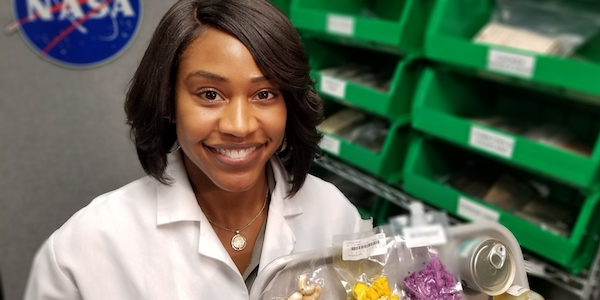
Developing Stellar Food for Space Exploration
Developing safe, nutritious meals to fuel astronauts’ space exploration is no easy task, but Takiyah Sirmons is using her food science degree from Iowa State to take on the challenge.
Sirmons (’08 food science), began her journey to becoming a food scientist when she took part in Iowa State University’s George Washington Carver Internship Program as a high school student from Oxon Hill, Maryland. She entered the summer-long “science with practice” program as a forestry and plant pathology intern, but soon became interested in food science after seeing the work fellow interns were doing in that area.
“By the end of that summer, I knew I wanted to pursue a degree in food science and Iowa State was the best fit for me,” Sirmons says.
Following her time at Iowa State, Sirmons went on to earn her doctorate degree in food science and technology at Virginia Tech. She later accepted a food scientist position at ConAgra Foods in Omaha, Nebraska, where she spent a year reformulating Chef Boyardee brand pastas.
In pursuit of a more research-based position, she came across a job posting for a food scientist in NASA’s Space Food Systems Laboratory at Houston’s Johnson Space Center.
“I wasn’t entirely sure what that entailed at the time, but understood space exploration was extremely challenging and a lot hinged on the crew’s ability to obtain proper nutrition from the food system,” Sirmons says. “I viewed the position as an opportunity to contribute not only to my field, but also to my country.”
The position turned out to be a role on the operations team contracted to produce foods for consumption on the International Space Station. Sirmons initially coordinated production of NASA’s thermally processed foods, then transitioned to her current position as a research scientist on the advanced food technology team.
The team works to identify novel solutions that improve the quality, nutrition and shelf life of foods in order to enable long-duration space missions.
“One of our biggest challenges is developing foods that last several years, meet the crew’s nutritional needs and appeal to their senses at the same time,” Sirmons says. “It’s a unique opportunity to contribute to space exploration. I hope to one day say I played a small role in getting astronauts back to the moon or maybe even to Mars.”
Sirmons says she extensively uses what she learned about safe food handling and product development, and is able to communicate effectively to the public due to her experiences and knowledge gained at Iowa State.
The late Sande McNabb, professor emeritus of the Department of Natural Resource Ecology and Management, and Thelma Harding, program director of the Ronald E. McNair Postbaccalaureate Achievement Program, each were instrumental in her success at Iowa State.
As her George Washington Carver faculty mentor, McNabb was the first person she met when she arrived in Iowa from Maryland. He later served as her faculty escort at graduation.
“He was an emeritus professor by the time I met him, but he was extremely passionate about mentoring and recruiting students into STEM fields,” Sirmons says. “I couldn’t thank him enough for his contributions to my life.”
Harding provided Sirmons a platform to conduct graduate-level research and pushed her to achieve excellence in all her studies.
“Without her support and guidance, I wouldn’t have gained the experience or confidence needed to succeed in a Ph.D. program,” Sirmons says.
Harding recalls Sirmons being a “model” McNair Scholar who completed all of the program’s goals and objectives in one year, instead of the standard two years.
“She was our first food science major, and she set the bar high for future McNair students,” Harding says of Sirmons. “She was committed, determined and was ready to enter graduate school by the completion of her bachelor’s degree, and she has gone on to earn the Ph.D. – the ultimate goal of a McNair Scholar.”
Sirmons’ journey came full-circle last summer when she had the opportunity to share her experience with Iowa State University George Washington Carver Internship Program participants – the same program that sparked her interest in food science.
“It’s actually one of my fondest professional memories, because it brought me back to where my journey first began,” Sirmons says.
Sirmons enjoys the challenges developing space food brings and encourages others to think outside of the box when considering a career path.
“If there’s one thing I’ve learned from my career path, it’s to be open to all possibilities – you never know where you’ll end up,” she says.



